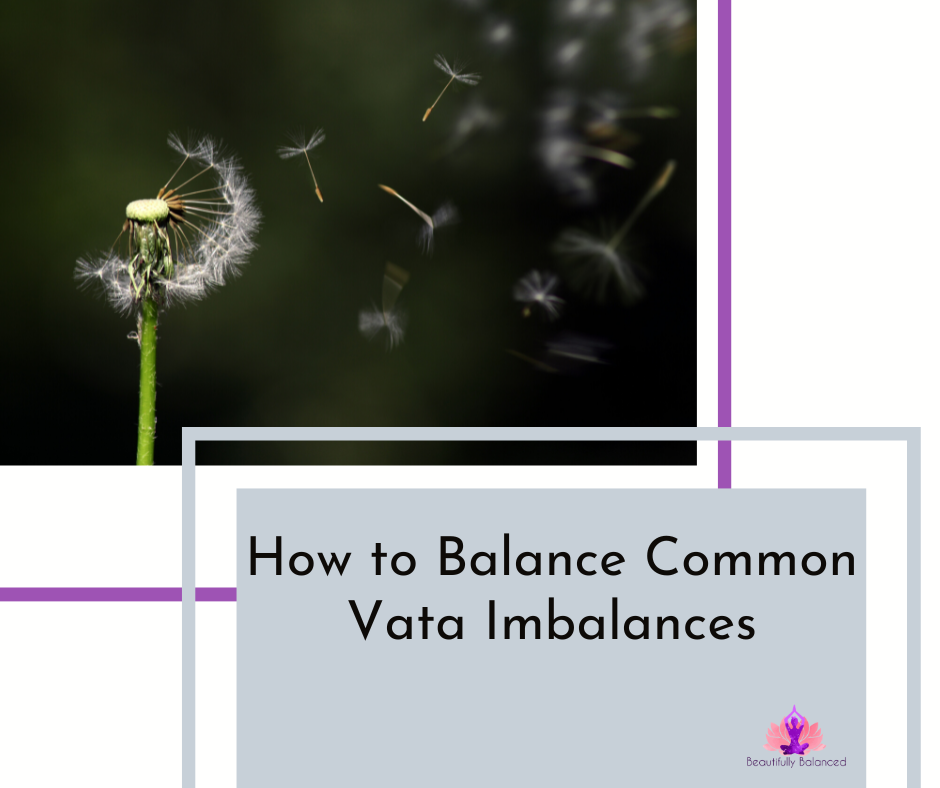How to Balance Common Vata Imbalances
- Samantha Dinnage
- Jul 19, 2023
- 5 min read

Let's delve into the topic of How to Balance Common Vata Imbalances.
In this blog there is:
A quick reminder of the key components of Vata dosha
Common Vata Imbalances
Remedies to Balance Vata
As a reminder.…
Vata Dosha:
Elements: Space (Akasha) and Air (Vayu)
Characteristics: Vata is associated with movement, creativity, and change. It governs bodily functions like breathing, circulation, and nerve impulses.
Physical Attributes: Those with a predominant Vata constitution tend to have a light build, dry skin, and variable appetite.
Emotional Attributes: Vata imbalances can lead to anxiety, restlessness, and fear.
When it comes to relieving anxiety vata is always a key focus as this will be out of balance but when we work on a deeper level and look at the overall health picture and who the person is and their natural way of being, we may reduce or bring out other doshas to live a life more in tune with who you are, which can be so freeing. Ayurveda really helped me to understand more about who I was and understand that we are all different and I needn’t compare myself as much to others.
As discussed in the previous blog, dosha imbalances can move through different stages, moving from minor symptoms to full-blown chronic concerns. When we can catch things being off balance earlier it makes it much easier to counter. I just love how Ayurveda aims to restore balance and promote well-being through personalised lifestyle modifications, dietary recommendations, herbal remedies, and other holistic approaches.
I saw a post the other day that was a great reminder that love is medicine, food is medicine, sleep, nature, sunshine, movement, laughter, and gratitude are all medicine.
Common Vata Imbalances
I used to relate to a lot of the Vata imbalances, I wonder if you will relate too, as we continue this episode.
Anxiety and Nervousness:
When Vata is imbalanced individuals may experience racing or scattered thoughts, difficulty concentrating, a tendency to jump from one idea to another, and a sense of unease. Discovering this really gripped my attention as it sounded just like me and finding my holistic ‘medicine’ was so life-changing! Vata imbalances can contribute to anxiety disorders, including generalised anxiety disorder (which I used to have), panic disorder, and social anxiety disorder.
Insomnia and Sleep Disturbances:
Excess Vata can disrupt the quality and duration of sleep.
Insomnia, difficulty falling asleep, waking up frequently, or restless leg syndrome during the night are common manifestations of Vata imbalance, however depending on the reason for waking up there may be other doshas at play.
Digestive Issues:
Vata imbalances can affect the digestive system and may cause erratic bowel movements, leading to irregular or variable appetite.
Symptoms may include gas, bloating, constipation, and dry stools - relating to too much air element!
Related digestive disorders include irritable bowel syndrome (IBS), which personally affected my life significantly for over 15 years! At one time I didn’t believe it would ever get better, thank goodness it did!
Joint and Muscular Problems:
Vata influences the movement and lubrication of joints and muscles.
Imbalances can contribute to joint stiffness, cracking sounds, and muscle aches.
Vata dominance can contribute to joint disorders such as osteoarthritis, where excess air is drying out the joints.
Dry Skin and Hair:
Vata-dominant individuals often have dry and dehydrated skin, with a tendency for roughness and flakiness.
Hair may also become dry, brittle, and prone to split ends.
Some skin conditions can relate to vata, however, Pitta is a key dosha to look into also when it comes to skin concerns, especially those that are red and inflamed.
Cold Sensitivity:
Vata imbalance can make individuals more susceptible to feeling cold.
They may have cold extremities, an intolerance to cold temperatures, and a preference for warm environments.
Irregular Menstruation:
Vata imbalances can affect the menstrual cycle in those people who menstruate.
Menstrual periods may become irregular, accompanied by symptoms like pain, bloating, tiredness, disturbed sleep, and mood swings. Other doshas may bring different menstruation symptoms, for example, Pitta could show up as irritability, acne, burning headache, and increased body temperature.
Nervous System Disorders:
Vata imbalances can impact the nervous system, potentially leading to conditions such as Parkinson's disease. Nerve-related symptoms may include tremors, muscle weakness, numbness, tingling sensations, and nerve-related pain.
Fatigue: Due to the moving and changing nature of Vata, Vata-dominant individuals may experience varying levels of fatigue and lack of energy if not nourished well.
Addressing Vata imbalances involves incorporating grounding and nourishing practices, such as establishing a regular routine, practicing gentle exercises like yoga, consuming warm and nourishing foods, and incorporating self-care activities to promote relaxation and calmness.
Ayurvedic remedies to balance Vata
Coming back to the idea that food, movement, and nature are all medicine - let’s have a look at ways to pacify Vata dosha.
Establish a Routine: Follow a regular daily routine, including consistent sleep and wake times, meals, and self-care activities. This helps bring stability and grounding to Vata dosha.
Maintain Warmth: Keep yourself warm and protected from cold and windy environments, as Vata is aggravated by cold. Dress in layers, especially during colder seasons.
Calming Practices: Engage in slow and calming activities such as yoga, meditation, deep breathing exercises, and gentle stretching to promote relaxation and reduce stress.
Regular Exercise: Incorporate light to moderate, grounding exercises such as walking, swimming, and enjoy dance to promote physical stability and mental relaxation.
Create a Nurturing Environment: Surround yourself with a peaceful and supportive environment, with soft lighting, calming scents, and soothing music to create a sense of relaxation.
Dietary Recommendations:
Warm and Nourishing Foods: Favour warm, cooked, and moist foods to balance Vata. Include healthy fats like ghee (clarified butter), sesame oil, and olive oil in your meals.
Sweet, Sour, and Salty Tastes: Emphasise foods with these tastes as they help balance Vata. Examples include sweet fruits, root vegetables, grains like rice, and dairy products (if tolerated).
Adequate Hydration: Drink warm or room temperature fluids throughout the day to keep the body hydrated. Warming herbal teas like ginger & cinnamon can be beneficial.
Avoid Excessive Stimulants: Minimise or avoid caffeine, as it can overstimulate Vata. You could opt for herbal teas instead.
Regular Meal Times: Stick to regular meal times and avoid skipping meals to maintain stable digestion. When we feel busy and scattered sometimes it can be so easy to skip a meal but it can help to calm and ground you.
Herbal Supplements:
Ashwagandha: Known for its grounding and calming properties, ashwagandha helps reduce anxiety, promote better sleep, and support overall well-being. However, it’s not recommended until any toxins that may be present are removed.
Brahmi: Supports mental clarity, focus, and relaxation, and helps alleviate stress and anxiety.
Triphala: A blend of three fruits (Amalaki, Bibhitaki, and Haritaki), Triphala aids digestion, promotes regular bowel movements, and supports overall digestive health.
I hope you’ve found this blog interesting. It’s looked at:
A quick reminder of the key components of Vata dosha
Common Vata Imbalances
Remedies to Balance Vata
I’m always happy to hear from you or answer any questions, drop me a message over on Instagram @sam.anxiety.relief.coach or email me anxietyreliefwithsam@gmail.com























شيخ روحاني
رقم شيخ روحاني
شيخ روحاني لجلب الحبيب
الشيخ الروحاني
الشيخ الروحاني
شيخ روحاني سعودي
رقم شيخ روحاني
شيخ روحاني مضمون
Berlinintim
Berlin Intim
جلب الحبيب
سكس العرب
https://www.eljnoub.com/
https://hurenberlin.com/
https://www.blogger.com/profile/14805511932941819302
https://www.blogger.com/profile/00749959524029140964
جلب الحبيب بالشمعة
Really insightful post! I love how clearly the key points are explained. For anyone looking to improve website visibility or start a career in digital marketing, an SEO course can be extremely beneficial. Such courses teach on-page and off-page optimization, keyword research, link building strategies, and analytics, helping learners understand how search engines rank content. By gaining practical knowledge and applying real-world techniques, participants can enhance organic traffic and strengthen their digital presence effectively.
The Defence Colony Escort give you romance, passion, and fun every time. They know how to making you realize your fantasies, leaving you always desiring more.
Spoil yourself and take advantage of Gurgaon Escorts Service. Discover a night of unimpeded passion, adventures, and fun!
A healthy relationship aren’t perfect—but they’re worth it. Find out how daily habits, honest conversations, and shared pleasure keep love alive and thriving.If you enjoy it, then read the full blog on Adultscare.